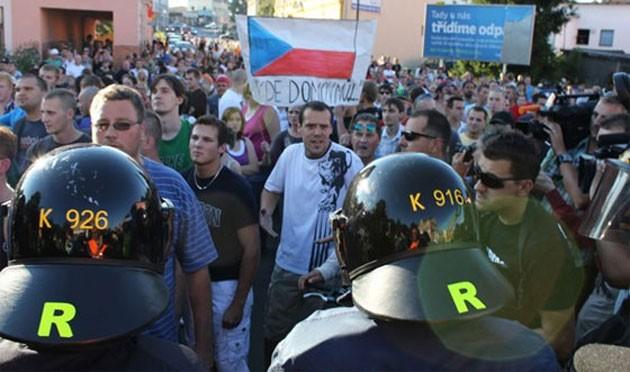The mayors of villages throughout the Šluknov foothills recently sent a letter to the Czech Prime Minister asking the state for help and warning that last year’s hate marches against Romani people could be repeated again this summer. During the summer of 2011, neo-Nazis convened a series of marches in towns throughout northern Bohemia and outraged citizens from the region, which is afflicted with high unemployment, threatening to lynch Romani people there.
RESPEKT magazine has reported that during recent visits to the towns of Rumburk and Varnsdorf, some of these mayors have proven able to reduce these tensions on their own. The small town of Dolní Poustevna, two sides of which abut the border with Germany, is now just beginning to experience these tensions as well.
Several Romani families have recently moved into the town. How does Dolní Poustevna plan to cope with this?
RESPEKT magazine reports that the mayor evidently doesn’t intend to do anything to calm the situation in his community other than nod in agreement with its angry long-term residents. The small community until recently was home to less than 2 000 inhabitants, 13 % of whom were unemployed.
Six months ago, several Romani families moved into town, pushing population numbers over the 2 000 mark. This caused quite a stir, with people lining up at the town hall to ask the mayor to move the Roma out of town.
"There are at least 30 of them, it’s horrible – maybe even 50," says a young female resident with a two-year-old child in a pram, "one can’t live here anymore. We’ve stopped going to the playground, their children are terribly lively there and their parents smoke."
The young woman claims to be afraid to ask the newcomers to smoke elsewhere because she doesn’t know them and is concerned they might treat her rudely. She also claimed to have heard them speaking among themselves in a rather vulgar way.
"We don’t mind Romani people here, Romani people were living here before, but they are old-timers who cause no problems, we know them. We don’t know these people and we don’t know what to expect," the woman says – she doesn’t know what these people might do, is afraid to get to know them, and doesn’t want to have anything to do with them, so she hopes they’ll leave just like they came.
In front of the apartment building into which two of these Romani families have recently moved from Domažlice, four little boys play while their mother watches from the window – her husband has gone to find work, as sometimes the Vietnamese retailers whose stands line the highway to Germany will hire him to do odd jobs for a few hundred crowns. "We came here from Klatovy because it didn’t bother the landlord here that we are Roma and they didn’t ask for a deposit," says another tenant in a nearby building, who lives in a ground-floor apartment with his common-law wife, their child, and his parents.
A walk through the small town doesn’t show any indications of mischief underway, but the mayor says the town hall is thronged with complaints. People want the newcomers to leave.
"It’s a kind of fear of the unknown, it’s unpleasant for people just to walk by them," explains Mayor Miroslav Jemelka, "I face daily rebukes asking how I could have let this happen. I explain to people that if it were up to me I wouldn’t let them in here, but I have no legal option for refusing residency to inadaptables who arrange to be housed here."
Recently someone allegedly stole tools from the local boatyard, and someone else’s towels hung out to dry reportedly disappeared from a garden near the border. "Everybody believes they’re doing it. Moreover, what’s weird is that they leave their homes mainly after sundown, why?" the mayor asks with a dramatic pause as his glasses balance on the tip of his nose. "How do we know they’re not going out to see what they can take?"
Experts in social inclusion have advised the mayor to introduce the new arrivals to the old-timers in order to calm these initial fears. They have explained that this is called a "community gathering", and that it usually helps, especially in cases where nothing dramatic is actually happening.
There’s just one snag: Mr Jemelka is 59 years old and has only four years until he retires, exactly the length of a term in office. This coming fall he wants to convince his fellow citizens to re-elect him, and if he fails, he too could end up on welfare.
Mayor Jemelka has been in office since 1992 and has long forgotten the building profession in which he used to make his living. "There’s nothing else I know how to do, where would I find a job?" he asks bemusedly. "If I were to start telling all these fed-up people that they’re wrong, and that nothing’s going on here, and that we should first get to know these Roma, they’d run me out of town. I really can’t do that."
The mayor does not intend to do anything to calm people down but nod in agreement with the angry old-timers and rely on the cost of train tickets. Locals must commute into Rumburk or Šluknov to collect social benefits and welfare from the authorities, the cost of which is no joke for the poor.
"A one-way ticket into town costs CZK 80 [EUR 3], they won’t be able to afford it, or I hope not. Then maybe they’ll move away," the mayor says.
